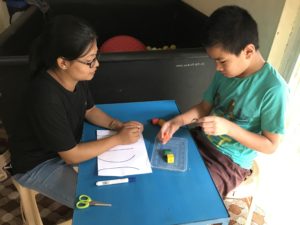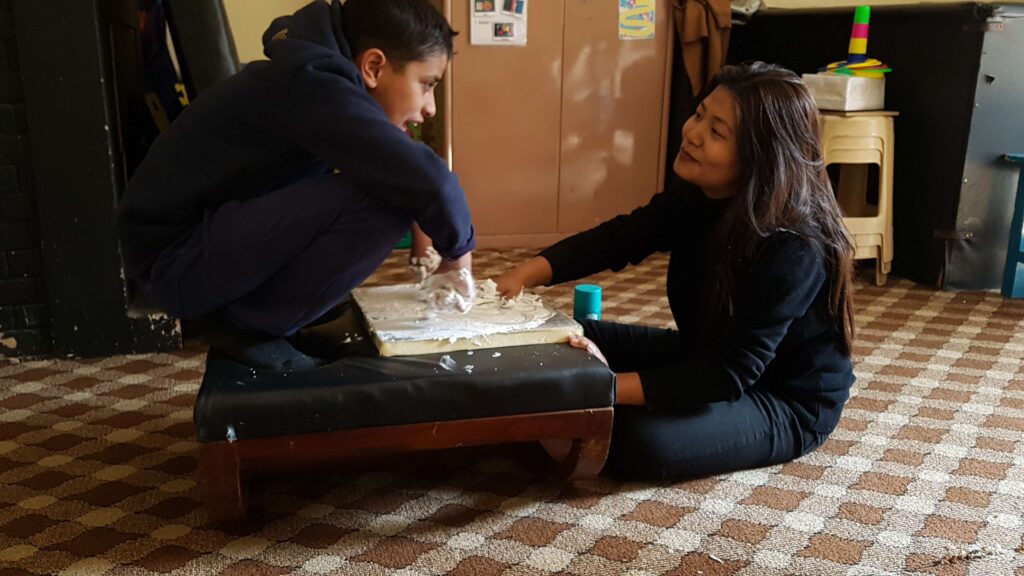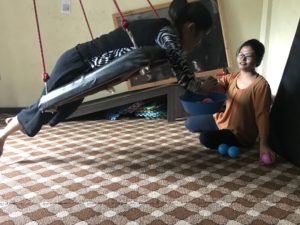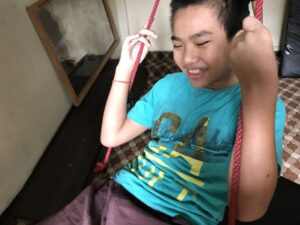Occupational therapy for children with autism
Occupations are daily activities in our life that give us meaning and occupy our time. And to children, occupation includes play, education (learning and academic skills), self-care skills (dressing, grooming, bathing, toileting), eating and feeding, sleeping and anything that a child needs to do to fulfil their role as a family member, student, and friend.
Occupational Therapy (OT) is a profession which aims to promote health and wellbeing through occupation. It assists individuals to engage in everyday activities or occupations that they want and need to do. OT helps children reach their maximal functional level of independence by facilitating development. When skill and strength cannot be developed or improved, OT offers creative solutions and alternatives for carrying out daily activities.
To be specific with autism, children with autism often has trouble communicating and interacting with other people; his or her interests, activities, and play skills may be limited. Occupational therapy may help people with autism develop these skills at home and in school supporting an individual’s functional skills (ADLs, learning etc). Many individuals with Autism experience sensory preferences and behaviours which can be supported with OT support. Some 70% or more of people with Autism have differences in sensory perception and processing (Yasuda, 2016). Also, evidence indicates the effectiveness of OT treatment with children with Autism report positive results (Pfeiffer et al, 2011, Schaaf & Blanche , 2011; Schaaf et al., 2013).
Occupational Therapists work with children to help them cope with difficulties that interfere with their ability to perform everyday occupations and play skills. Treatment focuses on helping people with a physical, sensory or cognitive disability to be as independent as possible in all areas of their lives. OT improves the functional skills that children require across all environments and in the things that children do in their everyday life, these include:
- Play (both alone and with others)
- Learning (not just in academics but in everything that they do socially, in movement, and in self-care)
- Attention
- Moving with control (whether it be their fingers for drawing or their body for jumping)
- Developing independence in self-care skills
- Organise themselves (such as for playing a game, or packing their bags for school)
OT focuses on making everyday life easier for children with developmental challenges, their families and those supporting them.
OT can help children develop their abilities in:
- Table top (fine motor) skills: pencil skills, colouring drawing, writing, scissor skills
- Gross motor skills: running, jumping, hopping, skipping, ball skills, table posture
- Sensory Processing: sensory reactions to the body or outside stimulus which impacts attention, behaviour and learning
- Self Care: daily skills of getting ready for life like dressing, toileting, hygiene, eating and sleeping
- Self management: general organisation, keeping track of personal items, knowing the time, and using money

Physio therapy for children with autism
Autism spectrum disorder (ASD) is a developmental disability resulting in social, communication, and behavioral challenges. Symptoms begin in early childhood and continue throughout the lifespan. Children with autism spectrum disorder (ASD) experience delays in the development of basic skills in specific areas. Motor (movement) skills are one of the impairment in individuals with ASD. Research has shown that motor coordination, postural control, and learning of skills through imitation of the movements of other persons may be limited, and planning and completing new motor tasks are challenges for many children with ASD. Early motor delays in children with ASD may contribute to difficulty acquiring social skills.
Research also shows that early intervention services can help children with ASD learn important skills and improve development. Early diagnosis can help a child with ASD achieve full potential.
Role of physiotherapist for children with Autism
Physical therapists are members of teams that provide services to children with ASD and their families from early childhood, through the school years, and into adulthood. We provide a program that the client will enjoy, while encouraging them to participate and become independent. We work with families and caregivers to increase a child’s participation in routines of daily life that are challenging. We also promote opportunities during free play and structured play to develop and practice the movement skills common to your child’s age group. For better outcomes and most effective treatment results, we encourage for early referral as it is the key. Infants and children can be seen at home, day care center, early Intervention Programs, schools or clinics on a regular basis.
How Can a Physical Therapist help children with Autism
Physical therapists can work with your child, family, and educational team to help your child:
- Improve participation in daily routines at home and school
- Acquire new motor skills
- Develop better coordination and a more stable posture
- Improve reciprocal play skills, such as throwing and catching a ball with another person
- Develop motor imitation skills (seeing another person perform an action and then copying that action)
- Increase fitness and stamina


